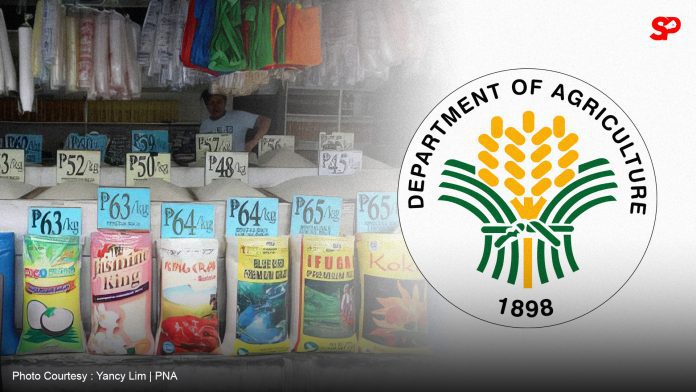MANILA – Retail prices of rice in local markets could have been higher without the tariff reduction on imported rice amid the weakening peso and the effects of successive typhoons, the Department of Agriculture (DA) said Wednesday.
“Kung hindi po ibinaba ni Pangulong Bongbong Marcos ang taripa sa 15 percent mula sa 35 percent, mas mataas pa sana ang presyo ng bigas ngayon (If President Ferdinand R. Marcos Jr. has not lowered the tariff to 15 percent from 35 percent, the price of rice would have been higher now),” Agriculture Secretary Francisco Tiu Laurel Jr. said during the hearing of the House of Representatives super committee on food security issues.
“Kahit bumaba ang global price sandali, bumagsak naman ang halaga ng peso laban sa dolyar (Despite the temporary drop in global prices, the peso weakened against the dollar),” he added.
The peso slumped to a two-year low of 59 against the greenback in November.
The international prices of imported rice then range from USD550 per metric ton (MT) to USD580/MT from Thailand, and USD700/MT from Vietnam, Tiu Laurel noted.
The DA chief made the remark following the findings of the National Economic Development Authority (NEDA) that Executive Order 62 or the tariff cut on imported rice has not translated to lower market prices.
Lowering the tariff on imported rice was earlier projected to reduce retail rice prices by around PHP5 to PHP7 per kg.
Tiu Laurel, however, noted that retail prices of both imported and local rice should only range from PHP42 to PHP48.57/kg, and not on a PHP50 to PHP60/kg. level that is still observed in some local markets in the country.
As of December 7, prices of imported well-milled rice in Metro Manila range from PHP45/kg. to PHP54/kg., and PHP40/kg. to PHP48/kg. for imported regular-milled rice; while local well-milled rice is pegged at PHP42/kg. to PHP52/kg., and PHP40/kg. to PHP48/kg. for local regular-milled rice, according to the DA-Bantay Presyo (price monitoring).
Meanwhile, at the Bagong Pilipinas Ngayon briefing, DA Assistant Secretary Arnel de Mesa said the effects of successive typhoons on rice prices had been tempered by EO 62.
“Mayroon namang pagbaba sa presyo ng bigas as per the monitoring natin… Isa pang punto, sa dami naging pinsala at ng pagtaas din ng dollar exchange. Kung wala itong taripa ng ating pangulo, sigurado na mas mataas pa iyong presyo ng bigas (There’s a decline in rice prices based on our monitoring… Another point is that due to the damage [from successive typhoons] and the strengthening dollar. If there’s no tariff reduction from the President, surely the prices of rice will be higher),” he said.
De Mesa said the lower tariffs under EO 62 have also helped prevent rice smuggling in the country.
“Dahil dito, nawalan ng insentibo iyong mga agri smugglers na ituloy iyong smuggling dahil mababa na iyong taripa at mataas na rin iyong volume na pumasok (Because of this, the agri smugglers have no incentives due to lower tariffs and higher volume of import arrivals),” he said.
As of December 5, around 4.351 million MT of imported rice have arrived in the country, according to the Bureau of Plant Industry (BPI).
Price monitoring functions
Tiu Laurel, meanwhile, welcomed lawmakers’ support in securing measures to improve the DA’s enforcement function to ensure stable retail prices of agricultural commodities, particularly rice.
“That is a very welcome remark. Very important sa amin iyon. Salamat sa inyong suporta (Thank you for your support)… We will rush it before Christmas,” Tiu Laurel after being asked by House Committee on Agriculture and Food chairperson Rep. Wilfredo Mark Enverga to submit a position paper on the staffing pattern in the enforcement group for price monitoring and regulation.
“Kailangan namin ng mas maraming kakayahan para masolusyunan ang mataas na presyo ng pagkain. Kung pwede alisin ang limitasyon na pumipigil sa amin para magawa namin ang aming trabaho nang buo at walang balakid (We need more capacity to resolve the rising prices of food. If feasible, remove the limitation hindering us from working fully and unrestrained).”
Tiu Laurel, likewise, said it would be beneficial to have the previous powers of National Food Authority (NFA) restored.
Earlier, he said the NFA can revoke the license or permit to operate of unscrupulous rice traders; sell cheaper rice in public markets and local government units; import rice to address shortages; and warehouse inspections, among others. (PNA)

